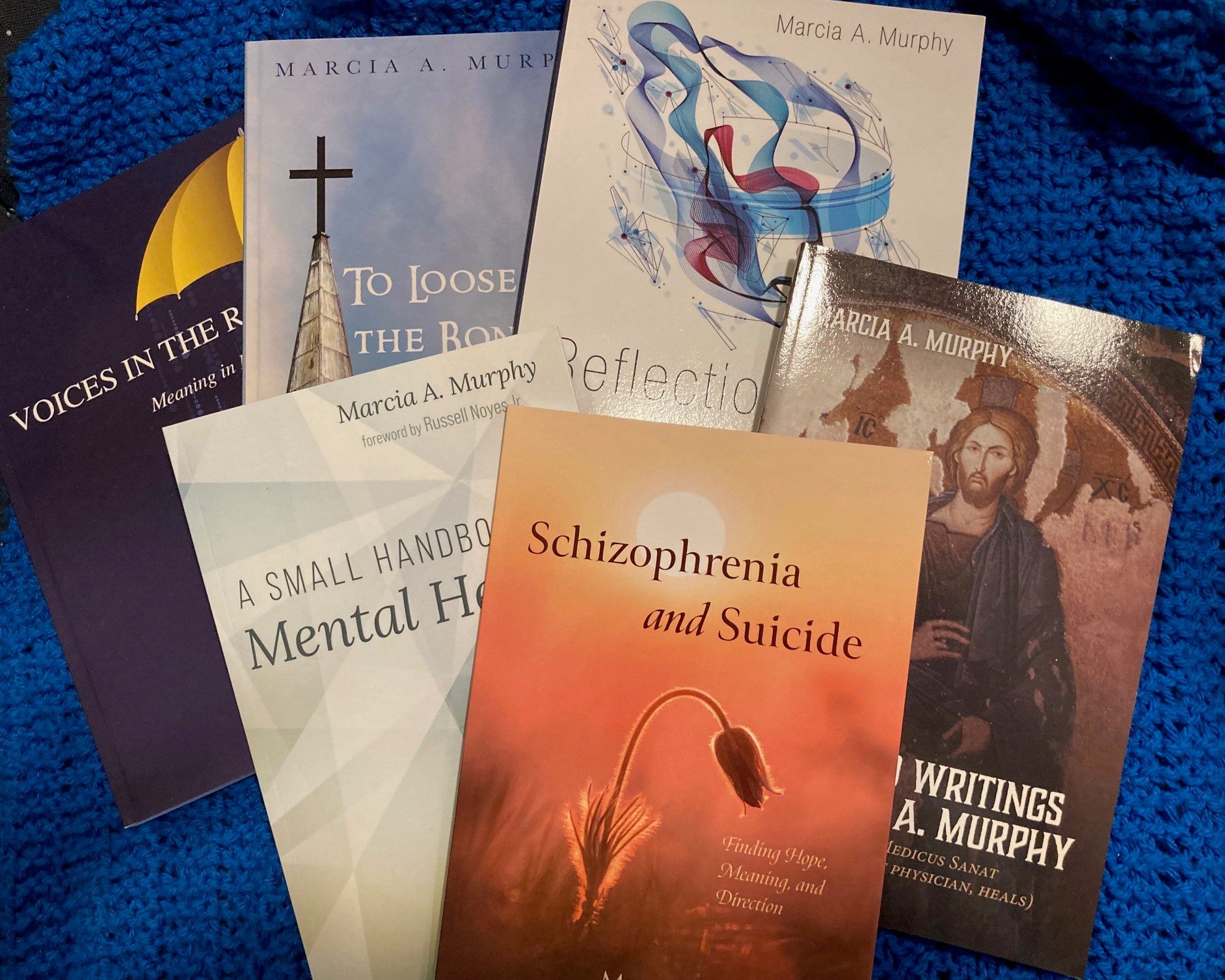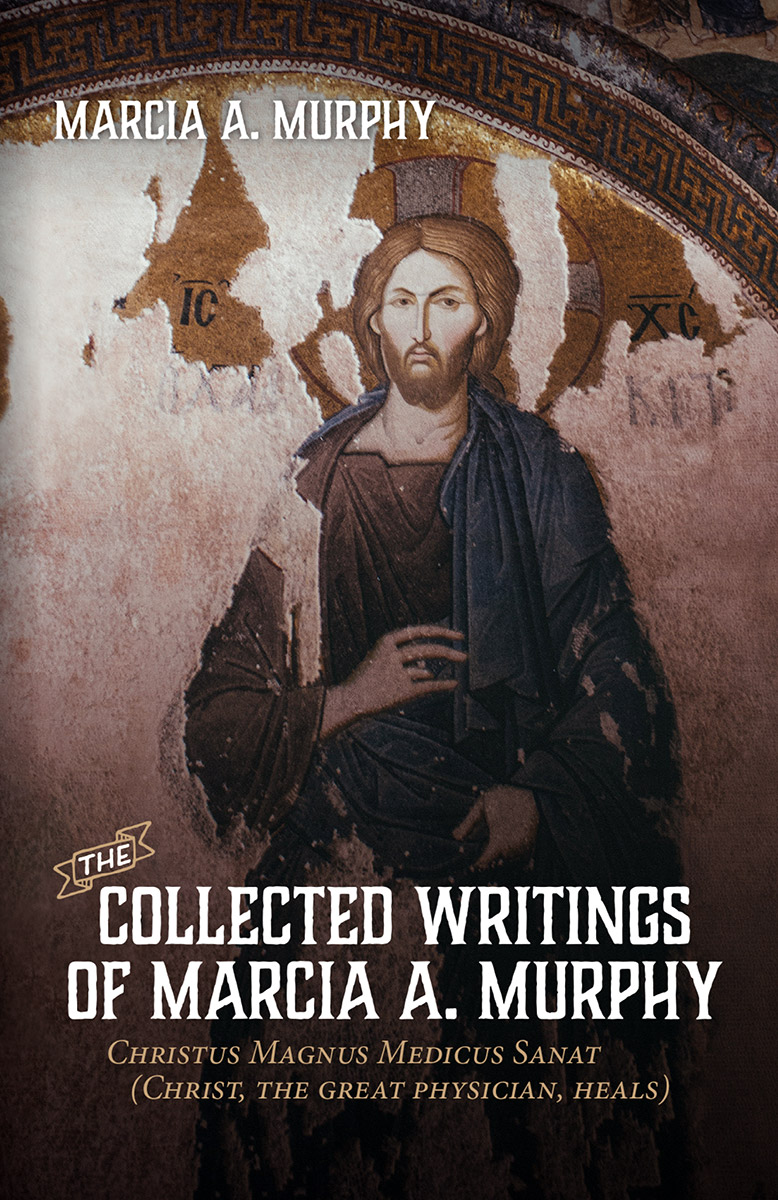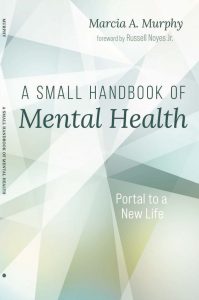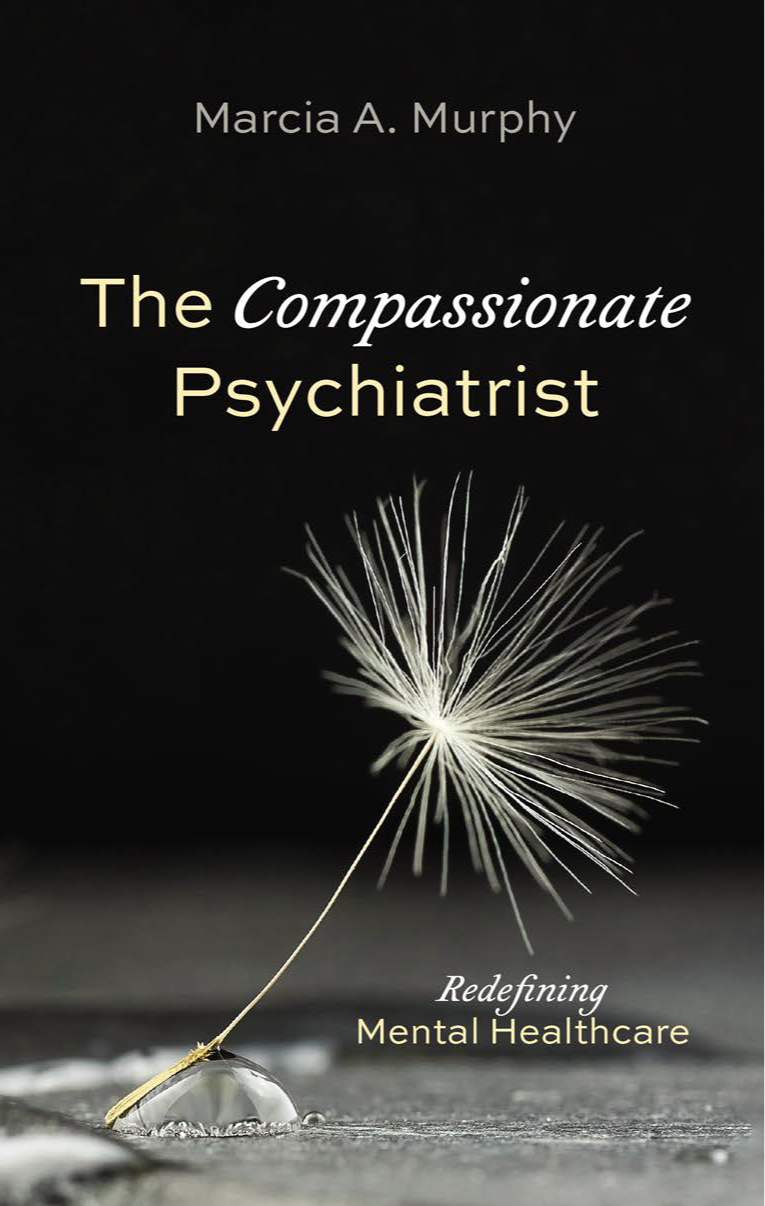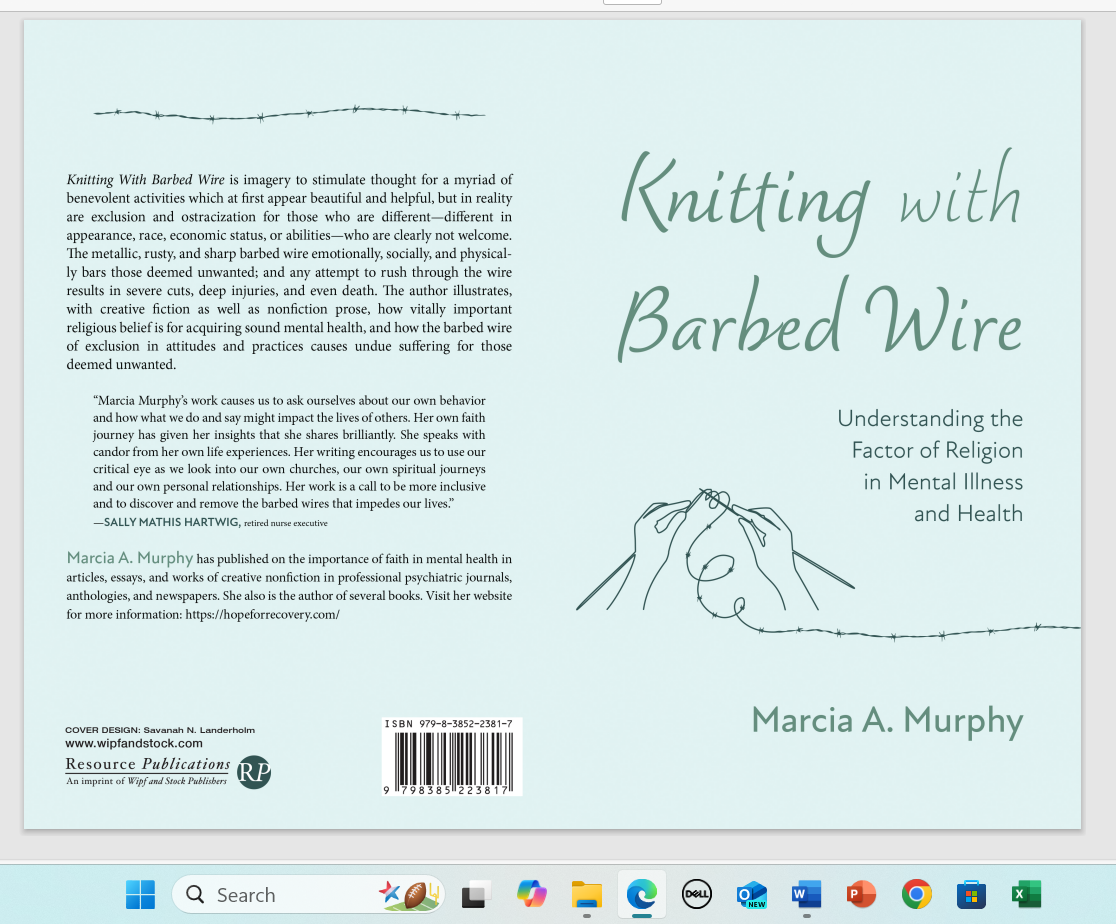
—————————————————————————————————————————–
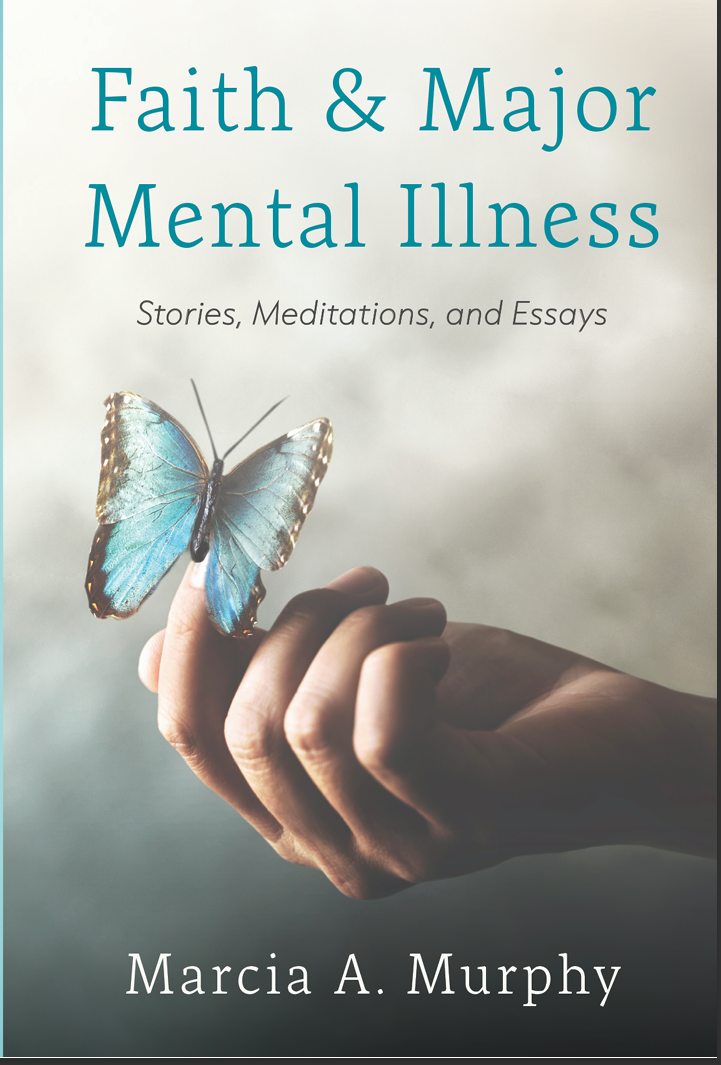
Purchase HERE Wipf & Stock Publishers, Resource Publications imprint
Summary page Here
Video Here
Marcia Murphy provides an honest and engaging account of what it is like to struggle with a major mental illness as a Christian. Describing herself as “radical and simple-minded,” she is at times provocative and controversial, but in this she also seeks to live out her faith with courage and compassion. Murphy provides some revealing reflections on how faith and illness exist in complex interrelationship in the daily realities of human life.
Christopher C. H. Cook, Emeritus Professor in Spirituality, Theology and Health, Durham University, UK
“In a Christian culture that too often ignores or silences the voices of those who live with major mental health challenges, it is important to listen to those who witness both to the challenges of mental illness and to the goodness and faithfulness of God. Marcia Murphy does this frankly, unsentimentally, and occasionally provocatively, and also reminds us of the goodness and power of human decency and respect.”
—Warren Kinghorn, MD, Professor of Theology and Psychiatry, Duke University Medical Center and Duke Divinity School
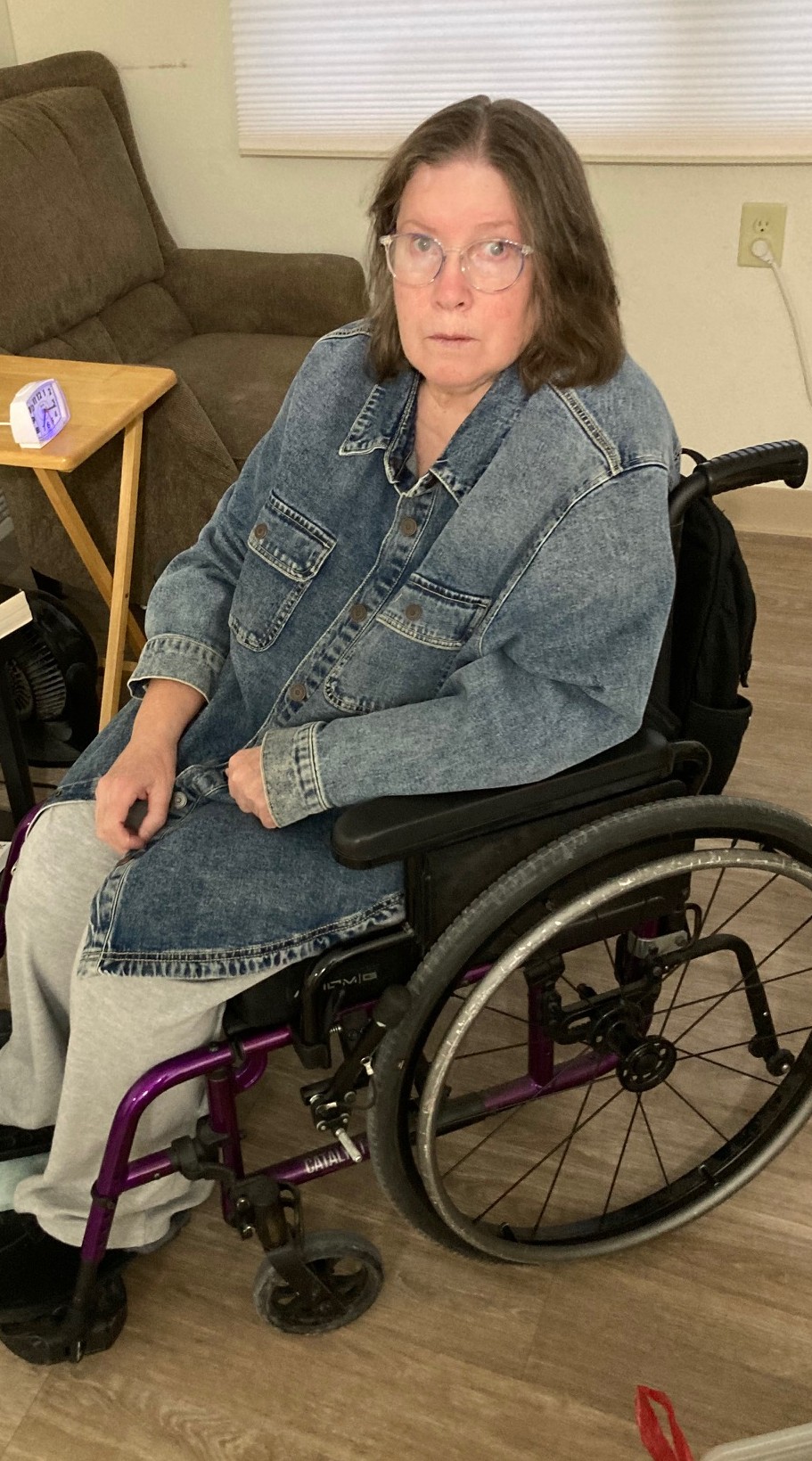
Marcia A. Murphy, 2026
Writer, Advocate for those with mental illness
Concerning the Importance of God
for Mental Health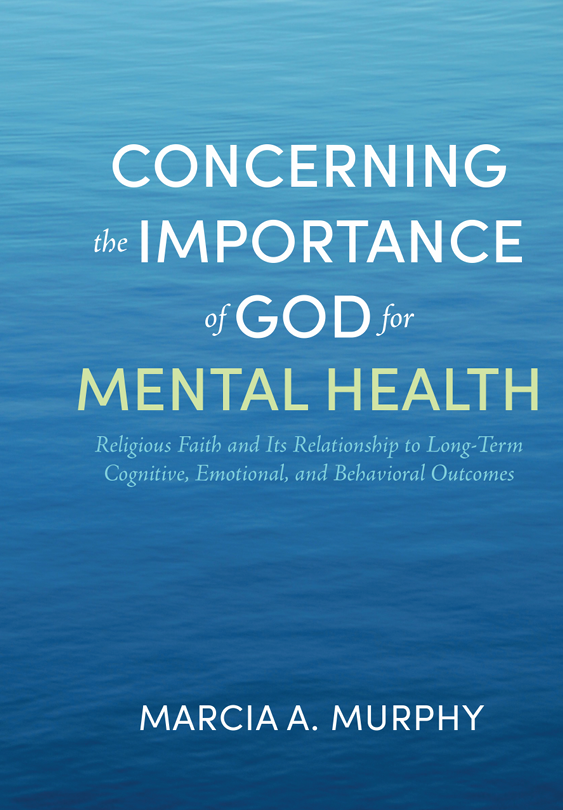
Preview Video Here
SUMMARY HERE
Purchase Here
“Drawing on her own experience, and a series of interviews with medical missionaries, Marcia Murphy has some important, and sometimes controversial, things to say about why belief in God matters when it comes to mental health. Written from a Christian perspective, this book gives insights into why psychiatrists need to take religion more seriously. Whether or not you agree with her, Murphy raises some vital questions about finding meaning and purpose in the context of illness and medical vocation.”
—Christopher C. H. Cook, Emeritus Professor in Spirituality, Theology and Health, Durham University

Marcia A. Murphy, author, mental health advocate 2025
Group for the Advancement of Mental Health (GAMH)
founded by Marcia A. Murphy- March 17, 2024
A Mental Health Initiative
GAMH members:
Paul Heidger, PhD
Margaret Heidger
Rosemary Plapp, PhD
Cecilia Norris, MD
Pat Penn
Karla Schmidt
Mary Schmidt
Marcia A. Murphy, team leader
Mission Statement
Promotes the dignity, value, and inherent worth of people who live with mental illness. To advocate through educational means, as well as provide practical, psychological, and social support for the mentally ill, the most neglected and marginalized members of society. GAMH, MHI, is a strong advocate for people – either abled or disabled. It works at identifying and promoting the role of hope and health in improving relationships in family, in society, in self-care, and in wellness. There are numerous initiatives created by MHI which focus on this mission.
During my early teen years I developed a mental illness. Since then my life has taken many turns, some towards recovery. I have written about my experiences so that the lives of others who have a mental illness might be improved. I hope that my insights will stimulate new thought concerning the meaning in psychoses, the forces of stigmatization, and the search for survival. My experiences and perspectives have implications not only for the psychiatrically disabled, but also for those who support the ill: their families, therapists, and physicians.
pax vobis
Marcia A. Murphy
Email: murphyma87533@gmail.com

Part I: An Integrated Approach
The resources in this section are evidence and support for an integrated approach to psychiatric care in treating the body, mind, and spirit. Through my writing I explain how spirituality, alongside of biology and other factors, is an integral part of recovery and is essential for healing the emotional, psychological, and physical suffering inherent in illness. Research has shown that spirituality in particular or, religious faith, play an important role in the recovery process. Marcia A. Murphy
“I agree with you that God is using your writing to help integrate faith in the mental health field (a long time secular institution).”
Shem Biebert, LPC
Licensed Professional Counselor
Christian Family Solutions, Counseling Care & Services
Milwaukee, WI
Resources on Spirituality and Health: Compiled by Marcia A. Murphy, September 2009 (PDF). These resources consisting of articles and websites provide evidence and support for an integrated approach in mental health care in treating the body, mind, and spirit. Research has shown that spirituality in particular or, religious faith, play an important role in the recovery process. This list can be a starting place for health care providers or anyone interested in this topic. A brief summary of the resource will precede each reference.
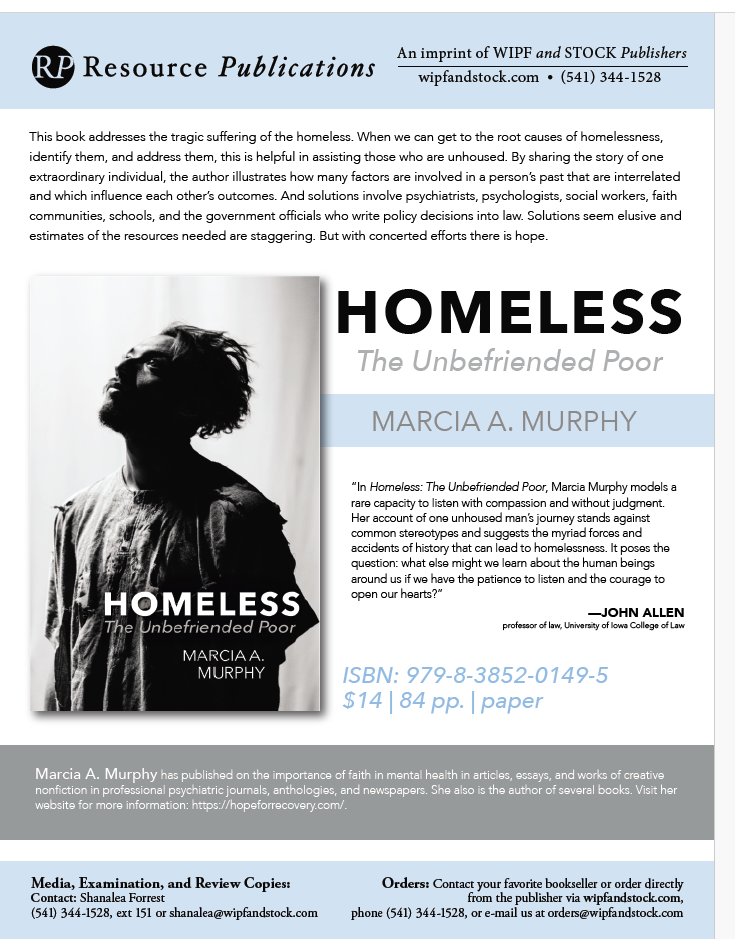
In Homeless: The Unbefriended Poor, Marcia Murphy models a rare capacity to listen with compassion and without judgment. Her account of one unhoused man’s journey stands against common stereotypes and suggests the myriad forces and accidents of history that can lead to homelessness. It poses the question: what else might we learn about the human beings around us if we have the patience to listen, and the courage to open our hearts?
John Allen, Herschel G. Langdon Clinical Professor of Law, University of Iowa College of Law
quote, paraphrased.

Marcia A. Murphy, author, mental health advocate
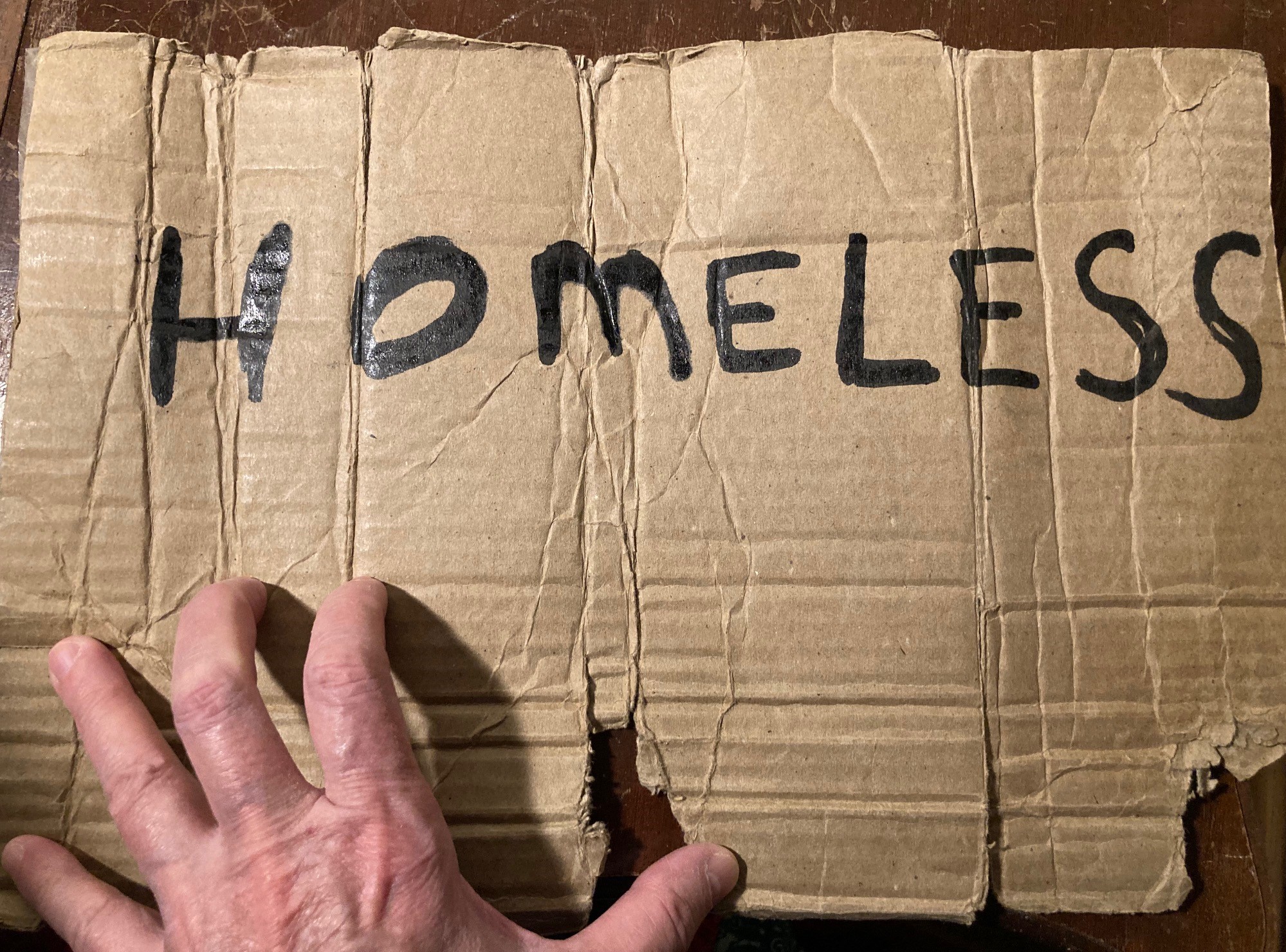
“Thank you . . . the book is really important. Thank you for addressing a serious issue by having conversations with the people impacted.”
Anne Mangano, Director, Iowa City Public Library
Apparel Fund/Patient Care Program for Psychiatric In-patients
Established in 2019 by MHI
Video featuring UI Psychiatrist
Dr. Tom Wassink VIDEO HERE
Learn More HERE and how to donate
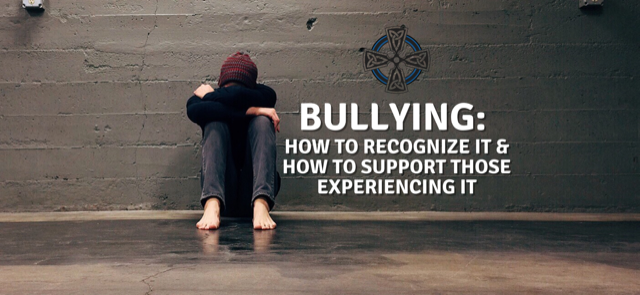
St. Andrew Presbyterian Church, Iowa City, hosted an online conversation on “Bullying: How to Recognize It, and How to Support Those Experiencing It.” The main speaker was Dr. Jamie Elizalde of the University of Iowa Department of Psychology and Psychiatry. The event was co-sponsored by St. Andrew’s Access & Inclusive Mission; Mental Health Initiatives; and Mission, Outreach, and Service Team.
For webpage with video (including YouTube URL) and list of additional resources: Here
Book Reading
November 15, 2020, Zion Lutheran Church, Iowa City, hosted a book reading given by Marcia A. Murphy. Click on: Book Reading Collected Writings
Video
Marcia’s YouTube Channel: Spirituality & Mental Health
https://www.youtube.com/channel/UC5DgDRREvAc1Dj2x1lFUWdQ
Marcia’s SlideShare:
Breathing Life Into Dust https://www.slideshare.net/yellow37/from-dust
From Death to Life: My Life Story https://www.slideshare.net/yellow37/life-storyrf
Books
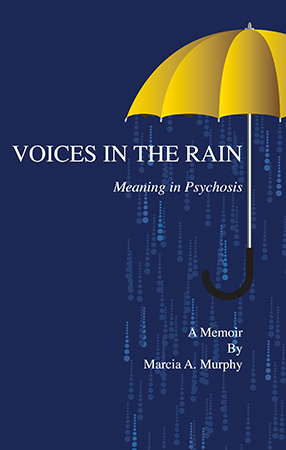 Allbooks Review International Editor’s Choice Award for 2011 Finalist
Allbooks Review International Editor’s Choice Award for 2011 Finalist
My memoir, Voices in the Rain: Meaning in Psychosis, is the story of my experience with mental illness through which I find spiritual meaning and, ultimately, God. As a person who has experienced severe psychiatric illness and landed on my feet, I believe I offer a unique first-person perspective. I tell what such illness is like, its symptoms, stigmatization, hospitalizations, and daily life. I take you into my world where I found insights into the spiritual meaning of my illness. My story may give desperately needed hope to others who are ill, their families, psychiatric professionals, as well as to those who know someone who is ill.
Available from:
Wipf & Stock Publishers
To Order:
Click here to order from Wipf & Stock Publishers
Book Review
Review by Rev Dr. Christopher C.H. Cook, emeritus, Durham University, UK
Royal College of Psychiatrists Spirituality Special Interest Group (UK)
Wipf & Stock, Resource Publications, imprint. Published 12/07/2021
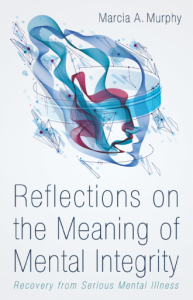
Author’s Video
Reflections on the Meaning of Mental Integrity
Recovery from Serious Mental Illness
by Marcia A. Murphy
In the midst of devastating mental illness, the author hears from God. Her resulting faith points her towards recovery. She tells us what steps she took, and that others must take, to achieve mental health. Hers is a unique and powerful voice. Patients and doctors both should listen.
—Russell Noyes Jr., MD, Emeritus Professor, Psychiatry Department, Carver College of Medicine, University of Iowa
In an impactful narrative, Marcia Murphy writes with the raw, first-person discernment of someone recovering from serious mental illness. Her prose highlights the interacting forces influencing mental health -– physical, psychological, social, and faith-based. Her courage in describing her own recovery and the importance of human interaction, community, prayer, and the arts can provide examples for health care workers and religious communities looking to serve alongside those striving to recover from mental illness.
—Cecilia M. Redmond Norris, MD Summary Here Purchase Here
Competing titles
How does it compare to similar books already available on the market?
Amen, Daniel G., The End of Mental Illness: How Neuroscience Is Transforming Psychiatry and Helping Prevent or Reverse Mood and Anxiety Disorders, ADHD, Addictions, PTSD, Psychosis, Personality Disorders, and More. Carol Stream, IL: Tyndale Momentum. 3/03/2020. $23.39.
If you wanted to find a book that is the ultimate contrast to Murphy’s own work, Daniel Amen’s The End of Mental Illness[1] is a case in point. His subtitle says it all: How Neuroscience Is Transforming Psychiatry and Helping Prevent or Reverse Mood and Anxiety Disorders, ADHD, Addictions, PTSD, Psychosis, Personality Disorders, and More.[2] Not only does Amen attribute mental health and illness solely to a physical material substance (the brain) without the spiritual attributes of the mind; he neglects the essence of being mentally healthy which is derived from the soul. He makes false claims such as there being no progress in psychiatry for the past seven decades (not true); and casting aside any humility, wants to remake something on a grand scale that he is only proposing from a limited, outside perspective (the objective observance of a professional), and, furthermore, from which he is drawing inaccurate conclusions. It is common knowledge that in any field, the ambitious often try to make a name for themselves and with this ambition will go to extremes. This is an extreme book. Even though Tyndale claims to publish from a “Christian perspective,” Amen’s book discredits that. Amen’s book has no substantial biblical background and lacks anything that Christians hold in the highest regard: the life of the spirit, the soul, the spiritual world (beings), human’s utter dependence on God’s sovereignty, grace and protection, including Christ’s role as healer by his witness through spoken testimony and acts recorded in the Bible.
Murphy develops an understanding of mental illness using a biblical foundation as background, along with the lessons learned from the wisdom (and failures) of not only Western psychiatry both currently and things gleaned over the past 300 years, but with the added depth of insights from the field of psychology and the vital contributions of religion. This will provide a holistic frame of reference and support a broader healing paradigm than one solely focused on a simple neurology of the physical brain. In addition, social milieus regarding familial and civic environments influence the myriad of mental troubles and my project addresses the micro aspect of one-on-one human interactions as well as macro connections within large communities. When trying to decipher causes of mental breakdown and what promotes healing, Murphy acknowledges the importance of good nutrition for the human body and brain, and hopeful thinking, but takes the reader further, through the complex picture of what moral, ethical, and value-based character looks like when speaking about a stable mental integrity. Mental integrity, a healthy mind, is what she is concerned about, and this can only be formed by adopting the God-given resources undergirding the Christian faith built upon biblical truths. A prudent psychiatry will recognize this and partner with those who are seeking to help patients develop a healthy character in tandem with logical and rational abilities. Right thinking, cognitive health, can dispel recurrent anxieties and other emotional problems because right thinking can promote a healthy lifestyle. Habits, patterns of healthy thinking, based on good values, will create a healthy life trajectory, leaving an unhealthy one behind; and it all starts with acknowledging God as the redeemer, protector, and sustainer of a healthy life.
So, wrong diagnosis, wrong cure. Neurologists in isolation and taking human beings out of context, will not end mental illness because mental health and illness encompasses so much more than the mere neurological processes of the brain.
[1] Amen, End of Mental Illness.
[2] Amen, End of Mental Illness.
Marcia Murphy’s book To Loose the Bonds of Injustice is a must-read for anyone working with the mentally ill. Combining memoir and a scholarly review of history, this book reflects the author’s spiritual and psychological journey in life. Policy analysts, religious leaders, and mental health professionals all can learn to do a better job helping those in need by reading this book.
—Scott Temple, PhD, University of Iowa Carver College of Medicine
To Loose the Bonds of Injustice
The Plight of the Mentally Ill & What the Church Can Do
By Marcia A. Murphy
Abstract Here
Wipf & Stock Publishers, Resource Publications, Imprint 
To Order Now Click Here
From Wipf & Stock Publishers
Resource Publications March 2020
The Collected Writings of Marcia A. Murphy
Christus Magnus Medicus Sanat
(Christ, the Great Physician, Heals)
By Marcia A. Murphy
Summary Click Here
Purchase Here
“Hers is a rare and powerful voice, one worth listening to.”
Russell Noyes Jr., MD, Professor Emeritus, Psychiatry Department, Carver College of Medicine, University of Iowa
Key Strengths of Book:
- Those who know persons with psychiatric disorders will gain appreciation of what recovery means and how it may be achieved.
- This is written by someone who has experienced mental illness who, therefore, can tell what the illness is like, providing insight for those who are ill or who provide care for people like herself.
- With the epidemic of opioid abuse and suicides by overdoses, this book offers much needed hope to those who are suffering or experience a lack of meaning in their lives.
A Small Handbook
of Mental Health: Portal to a New Life
by Marcia A. Murphy
Foreword by Russell Noyes Jr., MD
Summary Here
Resource Publications, Wipf & Stock Publishers
ORDER HERE
Wipf & Stock Publishers
Resources Publications, imprint
Schizophrenia & Suicide: Finding Hope, Meaning, and Direction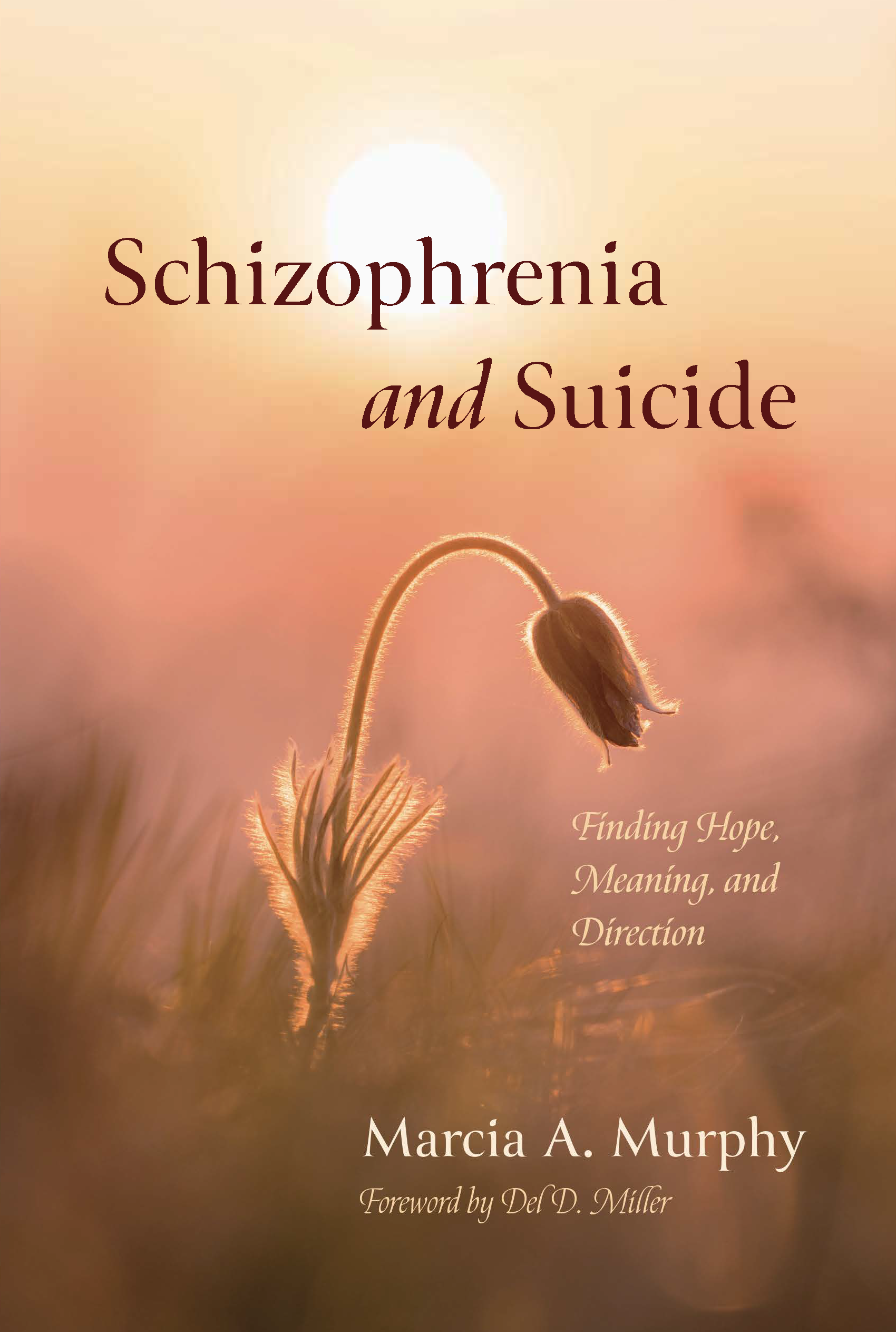
By Marcia A. Murphy
Foreword by Del D. Miller, PharmD, MD, University of Iowa Carver College of Medicine, Iowa City
purchase here
Summary
Video on Marcia A. Murphy’s new book: Schizophrenia & Suicide: Finding Hope, Meaning, and Direction HERE
Full Book Review by
Royal College of Psychiatrists Spirituality Special Interest Group (UK)
The Reverend Professor Christopher C.H. Cook HERE
Excerpt:
This short book includes some perceptive insights and wise observations. I would recommend it to all who are interested in the importance of spirituality in psychiatry, but also to those who are unconvinced. It provides a patient’s perspective on the ways in which one clinician offered more than just a professional/technical approach to care and, in doing so, affirmed the fundamental human worth of all who struggle with major mental illness.
Book Summary Page HERE
Preview Video HERE
PURCHASE HERE
Exploring clients’ ideas and perceptions of compassion and implementing the same in daily practice can be pivotal in redefining mental healthcare.[1]
[1] Sengupta P and Saxena P, “Art of Compassion,” 3.
2024 Wipf & Stock Publishers, Resource Publications, imprint
Knitting With Barbed Wire
Understanding the Factor of Religion in Mental Illness & Health
By Marcia A. Murphy
Book Review by the Rev. Prof Emeritus Chris CH Cook, Durham University, Royal College of Psychiatrists, Spirituality Special Interests Group, UK
REVIEW HERE
Summary of book Here
VIDEO HERE
Purchase Here
“A very effective metaphor!”
Tim O’Sullivan, Associate Publisher
Poets & Writers, Inc.
Articles
Grand Rounds, Schizophrenia Bulletin by Marcia A. Murphy (internet advance access May 4, 2006), Vol. 33, No. 3, 657-660 (2007). This short story is a work of creative nonfiction and is based on real events from my life. Dr. Gingerich (a pseudonym), my third psychiatrist late in my life, put on a Grand Rounds on the topic of recovery from schizophrenia. During the Rounds, I am interviewed and I talk to an audience of mainly psychiatric professionals, i.e., medical students, psychiatric residents and psychiatrists. I give my view of my experience of schizophrenia and what I believe brought about recovery.
First Person Account: Meaning of Psychoses, Schizophrenia Bulletin, by Marcia A. Murphy Vol. 23, No. 3, 541-543 (1997). In First Person Account: Meaning of Psychoses, I address the scientific community. I encourage mental health professionals to go beyond the biomedical model of brain dysfunction to consider the devastating impact of psychosis. I describe the psychotic symptoms I experienced as a young adult, problems I’ve had over the years, and factors that led to improvement in my condition.
[Coping With] The Spiritual Meaning of Psychosis, Psychiatric Rehabilitation Journal, by Marcia A. Murphy Vol. 24, No. 2, 179-183 (2000). In [Coping With] The Spiritual Meaning of Psychosis, I present a thematic analysis of the meaning of psychosis. This is based on interviews I conducted on individuals who were taking part in a rehabilitation program. In this article, I ask the psychiatric community to consider these persons’ interpretations of psychotic phenomena. And I urge counselors, therapists, and doctors to recognize how spiritual attitudes and lifestyles give direction and meaning to the lives of those with psychiatric disabilities.
The author wishes to thank Russell Noyes Jr, MD, for his editorial assistance with this article.
Rejection, Stigma, and Hope, Psychiatric Rehabilitation Journal, by Marcia A. Murphy Vol. 22, No. 2, 191-194 (1998). Next, Rejection, Stigma, and Hope describes the pain caused by stigmatization of the mentally ill. I share my own experience of stigma as well as the experiences of those at the rehabilitation center where I conducted interviews. I also give examples of discrimination and prejudice. To conclude the article, I tell of how I found hope in the face of rejection, and how I believe mental health professionals and organizations can restore dignity to the lives of those with psychiatric illness.
Psychiatric Illness from the Religious Perspective. Unpublished manuscript (1997). by Marcia A. Murphy Psychiatric Illness from the Religious Perspective was written with the intention of promoting spirituality in medicine. Using a combination of personal account and theory, I describe the transformative impact of psychosis. Standing alone, I feel the biomedical model of psychiatric illness is reductionistic. Instead, I believe a holistic view of mental illness is needed that merges secular psychiatry and religion. This validates the interconnectedness of body, mind, and spirit. I describe how adopting this perspective brought healing to my life.
Before I Started to Serve. In Sharon Kutz-Mellem (Ed.), DIFFERENT MEMBERS ONE BODY: Welcoming the Diversity of Abilities in God’s Family (pp. 27-28). Louisville, KY: Witherspoon Press (1998). by Marcia A. Murphy Before I Started to Serve is an essay published by the Presbyterian Church, (U.S.A.). In this one I state what any psychiatrist will tell you that schizophrenia does not involve split or multiple personalities. This misconception has been fueled by the media and Hollywood. I explain that schizophrenia is a term that covers many kinds of symptoms such as, thought disorder, hallucinations (auditory or visual), delusions, apathy, and withdrawal. A person can have some or all of these and individual cases vary enormously. This essay also provides examples of activities I undertook in the church which led to fellowship and a sense of well being. By involving myself in the religious community, I found that the love of Christ–through the Christian people–counteracts stigmatization that often breaks the heart and crushes the spirit of those with psychiatric disabilities.
Part II: “Come now, let us reason together…” Isaiah 1:18a
In this section I hope to encourage rational thought and discussion about controversial topics with the hope that such reasoning and communications will result in greater understanding.
Christian Apologetics and Postmodernism: A Rebuttal (2009). By Marcia A. Murphy. With this paper I hope to clarify various theological and philosophical positions that divide religious communities. Opposing camps often sit side by side on church pews. When we say we worship God what exactly is the focus of our worship? Can it matter to God as to who or what we think He is? Should it matter to us? This composition is just a brief preliminary sketch of a more complicated debate that I may develop elsewhere.
Reflections (2013). By Marcia A. Murphy. What is the church? Who are God’s people? This essay contains my reflections upon the apathetic condition of many who profess Christ. What does the Bible show God to be in regard to the afflicted, poor and oppressed? And, is the Christian community reflecting this God of the Bible and the example of Jesus Christ?
Letter to My Therapist (2013). By Marcia A. Murphy. Originally written because of a request from a person putting on a graduate school symposium on the topic of suicide, I wrote this letter to show the depths of problems that may compel a person toward suicidal thoughts and actions. These thoughts are my own, taken from my own experience. The answer from the therapist is authentic—my own therapist responded.
Eugenics & People with Disabilities: The Roots of Societal Rejection, Neglect and Indifference (2013). By Marcia A. Murphy. Who can decide who is worthy of life or death? How do we judge a human being’s worth? How do we treat those that society sees as weak and dependent? What is the Christian response? What is yours?
Having Tea With Anne Hutchinson: Justice, Four Centuries Later (2017) by Marcia A. Murphy. In this work of creative nonfiction I share my views on this controversial figure whom I claim got a bad rap several centuries ago and which continues in modern-day scholarship.
Controversial Topics:
Pluralism; LGBTQ; Tradition/Dogma; Why Jesus was baptised; Jesus as God and as human learning obedience: meaning of “perfection;” God’s identity regarding the question of gender

Guest Post
Source: Reasonable Faith
Recommended Reading
GREED: A Treatise in Two Essays by Julian Edney
Greed (or avarice) is an insatiable desire for material gain (be it food, money, land, or animate/inanimate possessions) or social value, such as status, or power.
(Wikipedia)
The Meaning of Protestant Theology
Luther, Augustine, and the Gospel That Gives Us Christ
By Phillip Cary, PhD
“The beauty and elegance of the writing, itself, is remarkable.”
Marcia A. Murphy

Author G.K. Beale, PhD, in his book, We Become What We Worship: a biblical theology of idolatry,
describes how we take on the characteristics of what we are most devoted to or worship.
It is what we value the most that shapes our lives and loves, be it God or the dark side, good or evil.
Our habits, our lifestyles, our priorities: do they point to God or another way?

